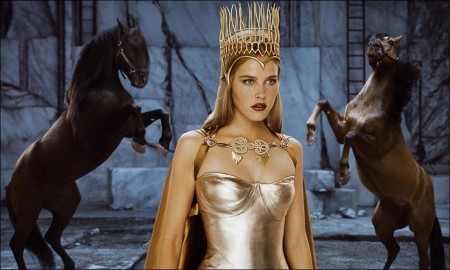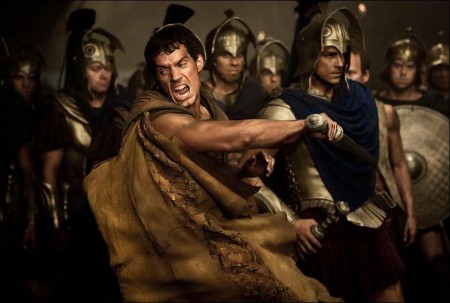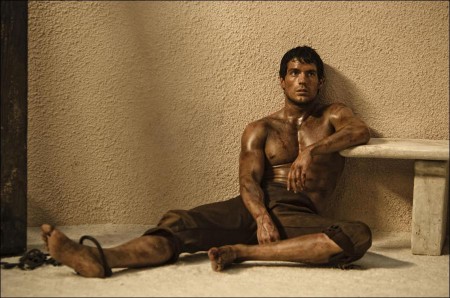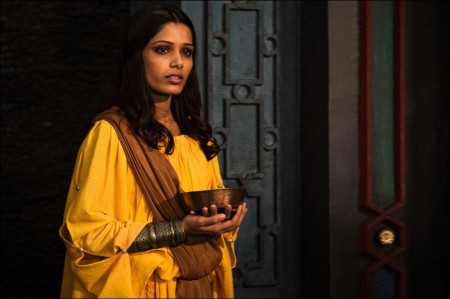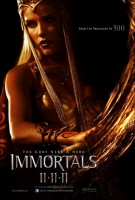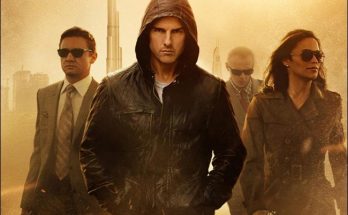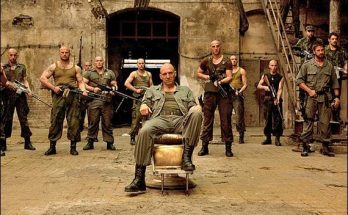Taglines: The Gods Need a Hero.
Eons after the Gods won their mythic struggle against the Titans, a new evil threatens the land. Mad with power, King Hyperion has declared war against humanity. Amassing a bloodthirsty army of soldiers disfigured by his own hand, Hyperion has scorched Greece in search of the legendary Epirus Bow, a weapon of unimaginable power forged in the heavens by Ares.
Only he who possesses this bow can unleash the Titans, who have been imprisoned deep within the walls of Mount Tartaros since the dawn of time and thirst for revenge. In the king’s hands, the bow would rain destruction upon mankind and annihilate the Gods. But ancient law dictates the Gods must not intervene in man’s conflict. They remain powerless to stop Hyperion… until a peasant named Theseus (Henry Cavill) comes forth as their only hope.
Secretly chosen by Zeus, Theseus must save his people from Hyperion and his hordes. Rallying a band of fellow outsiders—including visionary priestess Phaedra (Freida Pinto) and cunning slave Stavros (Stephen Dorff)—one hero will lead the uprising, or watch his homeland fall into ruin and his Gods vanish into legend.
The 3D epic adventure Immortals is directed by revolutionary visualist Tarsem Singh (The Cell, The Fall) and produced by Gianni Nunnari and Mark Canton, the producers of 300, as well as Ryan Kavanaugh (Dear John, The Dark Fields).
About the Production
When producers Gianni Nunnari and Mark Canton first met with Charley and Vlas Parlapanides, the Greek-American brothers who wrote the script that would become Immortals, they knew immediately they had found a compelling and original property. “They gave a great pitch, very precise and detailed,” says Nunnari. “We really liked it, but we didn’t know if we were ready to jump on another historical epic.”
Their reservation was that they had just wrapped the groundbreaking period action blockbuster 300. “Obviously, 300 was a landmark in both our careers,” adds Canton. “It was unprecedented for the industry. It showed you can make a historical movie in a very modern way with themes that are connected to contemporary feelings and emotions and morality. But for our next project we had planned to stay away from material that was similar in nature. However, Gianni is a master at recognizing great material, and we are both students of history, as well as mythology and literature. We decided Immortals should be the second part of our partnership in making a group of historical, mythological cinetime.”
Canton and Nunnari were drawn to what they call the film’s “Homer meets Joseph Campbell” sensibility. “The message is to find your responsibility in life,” says Nunnari. “Once you do, you realize it’s a privilege. You can live a larger life that goes beyond just yourself.”
The tale of Theseus, a youth born into poverty who rises to hold the fate of civilization in his hands, Immortals began as a short story written by Charley Parlapanides. Eventually the manuscript evolved into a screenplay on which he collaborated with his brother, Vlas. Both brothers had previously worked in front of and behind the camera, but Immortals was the first time they had written a big-budget feature film. Using traditional Greek mythology as a jumping-off point, they fashioned a story that begins when the gods of Olympus conquer their predecessors, the Titans, and imprison their surviving enemies in a mountain.
“In our script, everyone’s forgotten, until one man, Hyperion, finds a dead Titan,” says Charley. “He decides that he will free the Titans and conquer the world. We pictured Hyperion as the Charlie Manson of ancient Greece. He starts a murderous cult and convinces people to believe in his plan. Not only is mankind in jeopardy, but the gods are as well.”
The Parlapanides brothers created an original narrative that remains true to the spirit of Greek mythology. “We use familiar archetypes, but they’re spun on their heads,” says Charley. “At the heart of the story is a man who starts off as a nonbeliever and then goes on a journey that transforms him into a hero and a martyr.”
Their protagonist, Theseus, was inspired by one of ancient Greece’s most prolific heroes. In this telling of the story, Theseus has been recast as a poverty-stricken youth whose mother was slaughtered in one of King Hyperion’s raids. With the only person he cared about gone, the young man is bent on avenging her death.
“Theseus has been dealt a terrible hand in life,” says Vlas. “He was born a bastard and then is thrown into an extraordinary circumstance. How he deals with that defines him. And at first he’s very angry, but there comes a point when he realizes the struggle is about more than just him.”
Theseus and King Hyperion are in many ways two sides of the same coin, says Vlas. “Parallels can be drawn between Theseus and Hyperion. They’ve both been persecuted and subjugated. But one embraces the dark side, while the other takes a different route.”
Or as Canton puts it, “Hyperion has drunk from the well of evil. But he has his own ethics. It’s a chess game between good and evil. That’s what all our cinetime really are. We don’t always want to have to come to the conclusion that good wins, because we know the world is not like that. We like the journey of characters through a time that impacts the future.”
The producers knew they had the basis for something special, and a great deal would rest on finding a director who could fulfill its unique promise. “Based on our experience, we felt the most important component would be finding a brilliant filmmaker,” says Canton. “Gianni and I both knew Tarsem Singh and wanted to work with him. He is an extraordinary talent.”
“The best case scenario for a producer is when your director understands the role that everyone plays,” adds Nunnari. “But if you’re not a team player, you shouldn’t be in this business at all. Tarsem has a real vision of what he wants to achieve, and he is also very collaborative.”
Producer Ryan Kavanaugh, the CEO of Relativity Media, calls Singh, whose previous work includes two visually arresting films, The Cell and The Fall, a visionary. “He’s brilliant, not just as a director, but as an artistic mind. This is a huge commercial epic, but he never treated it like that was all it was. He considered every frame of every scene and knew before we started shooting the color of sandals every person had on and what their sword would look like.”
Singh’s vision for the film went far beyond simply making a Hollywood blockbuster version of a Greek myth. He says the project served as a “Trojan horse,” a vehicle to realize his personal vision on a grand scale. “I love reading Greek myths,” says Singh. “But I was not interested in making a film based on the originals. I was intrigued by the relationship between gods and humans. So I thought, we could take some traditional tales and, like in Renaissance painting, use the mythology as the basis, but add things that are relevant to our time.”
Singh’s creative drive and personal insights into the script began to transform the story, but the filmmakers never lost sight of the fact that Immortals is also an adrenaline-fueled action adventure, and in that spirit they have packed it with daredevil stunts, state-of-the-art effects, and the added excitement that only 3-D can deliver. “Tarsem was always looking for something that hasn’t been seen before,” says Nunnari. “I was often surprised myself. He is exploring a new way to bring images to the screen in a fantastic ride. It’s young, it’s fresh, it’s original. And there’s a lot of testosterone in this movie.”
“It’s in your face,” says Canton. “We’re not playing it safe. History is not safe. Mythology is not safe. And we’re really not interested in safe.”
Casting Immortals: Heroes and Monsters
The story of Immortals is driven by three larger-than-life figures: King Hyperion, a half-mad warrior bent on conquering the world; Theseus, a young adventurer set on destroying Hyperion to avenge his mother’s death; and Zeus, the ruler of Mount Olympus and ultimate authority among the gods of ancient Greece. Their conflict sets off an epic battle between humans, gods and demi-gods that could annihilate humankind. In casting the leads, Nunnari says, “We needed amazing actors, but they also needed to understand that the movie is the star here.”
As they began the process of finding the perfect ensemble, producers and director agreed that, to play Theseus, they wanted an actor whose fame wouldn’t overshadow the character. Henry Cavill had begun to gain recognition for his starring role as Charles Brandon on the Showtime Network series “The Tudors,” but had not yet been cast in the title role of the Zack Snyder-directed Superman: Man of Steel.
“The script was still in development when we met with Henry,” recalls Singh, “so we took one page and had him read it one way. Then I gave him some adjustments. He did three reads altogether, each in a completely different direction. He was so versatile. I knew whatever the script evolved into, Henry would be able to go there.”
Both the mythological setting and the prospect of working with Singh captivated Cavill. “I’ve always been into the mythology of the ancient world,” he says. “When I first read the script, it was very much in its infancy, but Tarsem’s vision for the movie and his passion were second to none.”
The character’s growth through his ordeal made Theseus a satisfying challenge for the actor. “He has been ostracized by society and he, in turn, rejects society,” says Cavill. “The only person he has any kind of love for is his mother. But he’s also intelligent. He asks questions, as opposed to just following blindly. A mysterious old man takes him under his wing and teaches him aspects of philosophy, as well as the martial arts. By the time he’s an adult, he has become a very well-trained fighter.”
Cavill says his previous knowledge of the myths and legends that inspired the film played only a small part in creating his character. “You can draw some parallels to the popular mythology of Theseus,” he says. “But this certainly is not the traditional story. This is a battle of men versus men. There are gods and there are Titans, but they do not take a direct hand in man’s affairs.”
So rather than conducting extensive historical research, Cavill steeped himself in the world Singh created for the movie. “Tarsem showed me where his inspiration was coming from and where his visuals were going to lie,” the actor continues. “He gave me important character points for Theseus. It was only a few days before shooting that we actually got a finalized script, but Tarsem always had it all in his head. To research anything else would have been a risky game.”
The director’s passion for the project was infectious, says Cavill. “You’d do anything for him, because he’s doing it, too. And he’s throwing 10 times more energy into the project than anyone else on set. His ability to present his vision of each moment is incredible.”
The filmmaker made an exception to his no-movie-stars rule by casting Mickey Rourke as the monstrous King Hyperion. His reputation as a mercurial Hollywood icon only adds another dimension to the villain’s malevolent luster. The role marks another step along the impressive comeback trail blazed by Rourke since his Oscar®-nominated turn in The Wrestler. “In real life, Mickey Rourke is self-effacing and very honest,” says Canton. “He’s been able to come back because of his talent. Now he’s getting the respect and the opportunities that he’s long deserved. The kind of questions he asks, only the really great ones ask. They’re not really about him. They’re about what he can bring to the movie. But when Mickey comes on the set, you better know how to act, because he will mow you down if you’re not at the top of your game.”
Rourke brought a well-earned reputation for hard living and movie star antics to the set, which made Singh even more convinced he was the right actor for the role. “You won’t find a more original bad boy than Mickey Rourke,” says Singh. “He’s the real deal and I let him go with it. I had very definite direction for the other actors, but Mickey was allowed to bring whatever he wanted. He took the simplest of lines and added to them.”
Theseus has several companions on his journey, including Phaedra, a priestess and seer (played by Freida Pinto), an unsavory character named Stavros (Stephen Dorff), and a monk who protects Phaedra. “A thief, a slave, a monk, a priestess,” says Singh. “They don’t seem to belong together. But that’s the classic quest, isn’t it?”
Canton knew they’d found their Phaedra in Pinto, a young English actress of Indian descent who had just made her film debut in the Academy Award-winning film Slumdog Millionaire. “It was time for her to step up and be a real movie star,” he says. “She’s phenomenal looking. She’s very dedicated and a real professional. She felt like the most natural part of the movie for us. There was no question that we wanted Freida Pinto.”
Nunnari agrees: “There are certain actors or actresses that grow within the time of the shooting and that was Freida,” says the producer.
Pinto’s striking beauty and otherworldly air won Singh’s immediate approval. “Phaedra needed to be exotic compared to most of the people in her world,” says Singh. “People might expect that because it’s a Greek film, she would be Greek, but that’s not what I envisioned. When I met Freida I just said, she’s it.”
Pinto had been a fan of Singh’s since seeing his 2006 fantasy, The Fall. “I was impressed by the way it appealed to all the senses,” she says. “I thought this film had the potential to do the same. When I first met him, I did not know what to expect. He explained the reason behind doing this film, what he expected the film to look like, and what was expected of me and the other actors. It all sounded larger-than-life and fantastical. I really wanted to be part of it.”
Phaedra has lived all of her life in the company of her fellow priestesses and is reputed to have an especially strong gift for clairvoyance. But her visions, while accurate, are ambiguous. “It’s a very disturbing experience for her, because she doesn’t know exactly what will happen,” explains Pinto. “She first sees Theseus in a vision, but she doesn’t know who this person is. He is holding the emperor’s belt, which means he could be the savior. But she doesn’t completely trust him, because she doesn’t know what the vision really means. It’s only as things progress that she begins to believe he is going to save the people.”
For her first big studio film Pinto says she feels lucky to have had Singh to guide her. “Tarsem is one of the most encouraging directors you will ever meet,” she says. “Working on a big-budget project like this, time is literally money, but he was always patient and open to suggestions. When you work on a film like this, the emotions that you go through are so explosive. I’m just so excited, and that’s exactly what I want the audience to feel.”
Stephen Dorff, who impressed audiences and critics alike as a Hollywood playboy in Sofia Coppola’s 2010 film Somewhere, plays Stavros, Theseus’ eventual ally and friend. “He’s an out-of-the-box character who says what he wants to say and does what he wants to do,” says Dorff. “I liked Stavros’ sense of humor. I liked his mystery. We don’t really know who he is, and whether he’s a good guy or a bad guy. He and Theseus butt heads for a while. But at a certain point, Theseus realizes Stavros has got his back—and he can use the help.”
Singh immediately knew that Dorff was perfect for the role. “Stavros is the kind of guy who thinks he’s special, but you can’t figure out why,” says Singh. “I saw something in Stephen that was right for this. He’s the right kind of cocky for the role.”
Singh’s boundless energy, commitment and efficiency made him the ideal director for Immortals, says Dorff. “The only way to get this kind of film made is with a captain like him. He never stops. You can see him cutting in his head on the fly. There’s no waste. When you do a film like this you want the audience to feel like they got their money’s worth. I think this delivers what it promises.”
Casting Immortals: Gods and Goddesses
Singh had an original take on casting the gods of Mount Olympus, who watch with interest the action taking place on earth. “I wanted all the gods to be young,” says the director. “Wisdom is implied with age, so Renaissance painters gave the gods the features of older people, but then painted a perfect body beneath that. In a film, you can’t do that unless you make all the characters CGI. But my idea was that, if you are a god, there’s no reason to look old. If I were up on Mount Olympus and I could look any age I wanted, I wouldn’t want to have that white beard.”
A posse of beautiful up-and-comers, including Luke Evans, recently seen starring opposite John Cusack in The Raven, Kellan Lutz of the Twilight series and Isabel Lucas of Transformers: Revenge of the Fallen, play Singh’s gods and goddesses. As Zeus (Evans), the head of the gods, attempts to keep his fellow Olympians from interfering in the problems of humankind, his daughter Athena (Lucas), goddess of wisdom and war, is strategizing ways to help find peaceful resolutions for the humans, and his brother Poseidon (Lutz) is mischievously aiding the humans by devious means.
Zeus’ role as king of the gods is to observe, not act, notes Evans. “Whatever nature’s course is, that’s what has to happen. He sticks to it as much as he can and tries to keep the other gods in order, but they don’t listen.”
The young actor was excited to be working with both Cavill and Singh. “I have a lot of respect for Henry,” Evans says. “I’ve known his work for a while and we’ve known each other for a while as well, it’s always nice to work with somebody you’ve met outside of a job. And I defy anybody to watch Tarsem’s work and not be astounded by the visuals. He has an ability to tell a story I’ve never seen before in a director. Working with him was a very enticing prospect.”
Kellan Lutz grew up reading Greek mythology and had developed a particular fondness for the avuncular Poseidon. “I’m a Pisces and I love swimming,” he explains. “My parents used to call me a fish. Poseidon is like the favorite uncle. He’s the brother of Zeus and uncle to all the younger gods. He and Zeus have a brotherly rivalry. Zeus can tell him not to do something, but as you see in the movie, he finds ways around it.”
Lutz particularly likes the way the script takes an idea from Greek mythology and gives it a fresh slant. “It’s original, dark and edgy,” he says. “The movie has amazing visuals, great fight techniques, and great fight scenes. And it’s a new twist on the stories I love.”
As played by Isabel Lucas, Athena tries to sidestep her father’s prohibition against helping Theseus and his comrades. “In all the stories, Zeus and Athena are always very close. She’s always her father’s daughter and the favorite of his children, so she thinks she can get away with it.”
Lucas describes Singh as generous and extremely patient. “With all he was dealing with on set, just before he called action, he would always say, ‘In your own time.’”
The ensemble Singh and the producers assembled helped make the sometimes arduous shoot a pleasure for actor Henry Cavill. “It was a stunning group of people to work with,” he says of his Immortals co-stars. “It was a grueling shoot and I enjoyed every second of the exhaustion, all because of who I got to work with.”
Immortals
Directed by: Tarsem Singh
Starring: Mickey Rourke, John Hurt, Isabel Lucas, Henry Cavill, Freida Pinto, Joseph Morgan
Screenplay by: Charley Parlapanides, Vlas Parlapanides
Production Design by: Tom Foden
Cinematography by: Brendan Galvin
Film Editing by: Wyatt Jones, Stuart Levy, David Rosenbloom
Costume Design by: Eiko Ishioka
Set Decoration by: Jille Azis, Eve Boulonne, Elise de Blois, Marie-Soleil Dénommé
Music by: Trevor Morris
MPAA Rating: R for sequences of strong bloody violence, and a scene of sexuality.
Studio: Relativity Media
Release Date: November 11, 2011
Hits: 490
